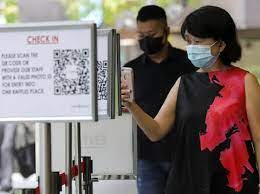Singapore, July 5: The ongoing COVID-19 wave in Singapore will not be as severe as the one driven by the Omicron variant that hit the country earlier this year, health minister Ong Ye Kung said on Tuesday.
Responding to a parliamentary question on the government’s response to the current wave of COVID-19 cases, Ong said the authorities had anticipated this wave when they learnt of the BA.4 and BA.5 subvariants.
These subvariants have a “significant growth advantage” over the earlier BA.2 subvariant, he said.
“This wave, however, arrived slightly earlier than the July and August timeframe that we anticipated,” Channel News Asia quoted the minister as saying.
“For this current wave, our assessment is that it will not be as severe as the Omicron wave we experienced earlier this year. This is because many more of us have gained stronger immunity, either through booster shots or recovery from infections. This will significantly impede the circulation and transmission of the BA.4, BA.5 viruses,” he added.
At the peak of the earlier Omicron wave, Singapore saw about 18,000 new COVID-19 cases daily.
Tuesday’s COVID-19 caseload is expected to be more than 12,000, about 10 per cent more than the last week, Ong said.
“There are indications that we are near the peak, if not at the peak, and we should be relieved that the number this week did not double from last week. Otherwise, we’ll be at 24,000 or 22,000 (infections) this week,” he said.
Of all current infections, about 50 per cent are from the BA.4 and BA.5 subvariants, the minister said.
“It has been doubling every week. Started at 3 per cent, then 5 per cent, then 8 per cent, then 16 per cent, 30 per cent last week, this week 50 per cent, next week, I would expect it to be 70 to 80 per cent. It is clearly a more dominant subvariant compared to BA.2,” he said.
In anticipating the wave of infections, the government has maintained the indoor masking requirement even when cases were “low and stable” to moderate the infection rate when the new wave arrives.
“If we still want to reduce the infection rate even further, more stringent safe management measures will need to be implemented. And that means reintroducing things like group sizes, capacity limits and masking outdoors,” said Ong. (PTI)
Trending Now
E-Paper


